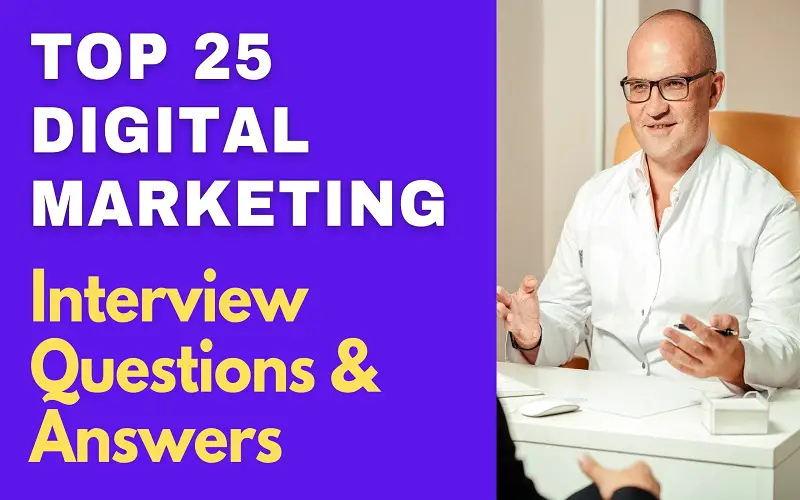With the advent and popularization of the internet, digital marketing is one of today’s most lucrative fields. This article will look at some of the questions you should expect when interviewing for a digital marketing post. Take a look at the following:
1. What Do You Understand by Digital Marketing?
Also known as online marketing, digital marketing is the use of the internet and online-based technologies to promote brands as well as create and boost customer engagement. It allows different brands to connect with their potential customers through online campaigns. Some of the most common types of digital marketing are display ads, paid social ads, social media posts, and online videos. It is, therefore, an improvement from traditional marketing.
2. Why are You Interested in this Role?
I love marketing and everything related to it. I love to help brands reach their target audience and create a long-lasting impression on customers. I particularly love digital marketing because it relies on the internet, which I use a lot. I can make and schedule posts and engage with customers at the comfort of my laptop. I also love maintaining an online presence since it keeps me updated with different occurrences and trends.
3. Mention Some of the Qualities that are Essential in this Field.
There are several skills that everyone involved in digital marketing should have. Since digital marketers face something new daily, they have to be adaptable and able to solve problems creatively. Digital marketing requires people who can think fast, solve problems, and not complain about them. One must also have excellent communication skills to engage with the target audience and give the brand a good image. Other qualities are excellent analytical skills, persistence, desire to learn, and unending curiosity.
4. What is the Most Serious Challenge that Digital Marketers Face Today?
There are a few challenges that we face as digital marketers. However, the biggest is the pressure from clients and brands to achieve and maintain excellent results, even though digital marketing keeps changing every day. We have to do more than schedule posts and interact with customers. We have to spend a significant part of our day monitoring new trends and trying new things, which is essential in staying relevant and useful in this ever-changing environment. I am glad to report that constant monitoring of recent trends has seen me reach where I am.
5. Tell Us About Your Experience With Collaborative Digital Marketing Campaigns
I have been involved in and even ran several collaborative digital marketing campaigns. These include collaborations with other companies and campaigns with other departments. As a person who enjoys working and collaborating with others on projects, I have to say that I enjoyed the experience. I have learned that all the stakeholders and parties must first agree on a strategy and clearly outline roles and objectives before kicking off the campaign. The team must also develop metrics and deadlines to help achieve the set goals.
6. Why Do You Think You are The Best Candidate for this Position?
I am well versed in digital marketing. This is my seventh year in marketing and my third as a digital marketer. I have a Degree in Marketing and a Master’s in Business Administration. I have vast experience managing social media accounts and running paid online campaigns. I have also had the chance to lead several teams in this field, which has helped me improve and hone my leadership skills. I believe that my experience, expertise, and qualities will help me succeed I’d given a chance.
7. Have You Ever Disagreed With Your Team or a Team Member? How Did You Handle It?
Yes, I have. Disagreements are common when collaborating with others on a project. Therefore, the most important thing is to know how to handle them. I recently disagreed with my team members on strategies for a paid campaign. On learning that we were not on the same page, I asked everyone to mention their preferred strategy and discussed them together as a team, slowly looking at the pros and cons. We then agreed on the best plan, which helped us succeed in our campaign. This experience, just like many others I have had in team settings, taught me the importance of valuing my team members.
8. How Do You Always Gauge Whether a Campaign is Successful or Not?
I mostly work in team settings where we set goals and objectives at the start of the project. When we meet 90% of the set goals and objectives, I always know that a project is successful. We also come up with a budget at the start of the campaign, which guides our operations. If we go over the budget, I always know that we messed up at a certain point and therefore review our procedures.
9. What is Your Most Successful Campaign?
I was once tasked to promote, create and manage social media accounts by a brand entering a highly competitive market. I was initially scared since our competitor had been in business for some time and was more of a monopoly. I started by gaining followers organically through customer engagement and creative posts that saw us gain 500 followers by the end of the month. I then came up with a schedule and plan to create brand awareness and promote it. By the time I was done with the project, I had ticked off all our goals. The client managed to penetrate the market and build loyal customers.
10. What Do You Prefer? Inbound or Outbound Marketing?
I don’t have a preference, given that I normally resort to both to run successful campaigns. I believe that they are useful to businesses as they complement one another. Inbound strategies such as social media and blogs are interesting and can reach several customers. On the other hand, outbound strategies such as paid search ads and email marketing directly appeal to customers. All a marketer needs to do is identify the right one to use at a particular time.
11. Are You Familiar With Digital Marketing Platforms and Software?
Yes. My time in this field has exposed me to several platforms and software, which I am well versed in. Some of the most common digital marketing platforms I have used are Facebook and Google(Google Ads). I normally use Hootsuite for social media purposes, which helps me schedule posts and engage with several followers. I also have vast experience with WordPress, which helps me manage and publish content.
12. What Do You Like Most about Digital Marketing?
I love the internet. I believe that it has revolutionized lots of things and made work easier. I, therefore, love digital marketing because it mostly relies on it. This field allows me to explore my creativity and engage with different people for brand promotion. I also love the fact that it is ever-changing, thus presenting me with new and different challenges every day to help me get better at my job. Digital marketing allows me to do what I enjoy most- coming up with creative solutions to solve problems.
13. How Will You Motivate Your Team to Give Their Best?
Having been in different teams before, I know how to get everyone on my team to be at their best. I normally appreciate my team members and let them know that they are valuable. One can achieve this through praises, acknowledgment, and occasional mentions. Also, when tasked with leading a team, I normally make sure that I inspire them towards achieving our goals and objectives. We usually have occasional team meetings where members brief each other and engage in team-building activities.
14. What Don’t You Like about Digital Marketing?
Digital marketing allows me to explore my creativity, and for that, I am grateful. However, I’m not too fond of the fact that it is a constantly changing field. It, therefore, puts lots of pressure on digital marketers. One has to be up to date with different trends and spend a significant part of their career identifying and monitoring them. Also, some clients are normally uncooperative, making our work harder and chances of success slimmer. However, from experience, I believe that this field gets better as you progress.
15. How Do You Normally Handle Negative Feedback?
I know the importance of feedback, especially when promoting a brand. I, therefore, appreciate all types of feedback, whether negative or positive. For negative feedback, I normally apologize to the social media user for any inconvenience and message them directly to know how we can assist. I then assure them that we will act on it or even make the necessary updates, if any. It has always worked for me. I believe that one of the worst mistakes that a digital marketer can make is engaging in an online war or altercation with a target client.
16. Mention a Time that You Failed in Your Role. What Did You Learn About It?
A startup firm gave me a social media account management gig at the start of my career. I was fresh from college and therefore didn’t have much experience. A social media user once tagged us in a post rubbishing our products and spreading malicious information. I couldn’t take it anymore and engaged him in an online war that almost tainted the company’s name. I thought that I was doing a good job defending the company when I made things worse in reality. I almost lost my job, and experience taught me the importance of emotional intelligence in digital marketing.
17. Why Did You Leave Your Last Job?
After three years working for my former company, I felt it was time to try a different setting where I’d meet new challenges. I started getting comfortable and slowly sank into a comfort zone, which normally comes with its repercussions. I also wanted to give someone else a chance and let them gain the same experience that made me better at this job. I believe that it is time for a change.
18. Could You Please Break Down Digital Marketing
Digital marketing is made up of inbound and outbound marketing. Inbound marketing refers to the use of social media, e-newsletters, and webinars in marketing to promote products or the entire brand. Outbound marketing entails ad placement, emails, or cold calls meant to reach potential clients directly. Both are important in digital marketing since a good digital marketer must know how to balance both inbound and outbound marketing. I am glad to report that I have extensive experience in both and will definitely do a good job if given a chance.
19. Could You Please Define SEO?
SEO or search engine optimization is the process of structuring and bettering a piece of content to increase its ranking on search engines, especially Google. It optimizes content to make it appear at the top of the page during searches. It also helps search engines index websites correctly, which is important for organizations. Someone looking for a particular product is likely to stop the search and click on the first links, which explains why digital marketers must be SEO experts.
20. Explain What a Keyword is and Its Relation to SEO
Keyword is a normal term in digital marketing. It refers to the word that a given user keys into a search engine when searching for information. Every digital marketer knows that keywords are essential in search engine optimization to help achieve better page rankings. Therefore, it is important to know how to use the keywords and where they should appear, as all these determine the site ranking. Anticipating what the user is likely to key into the site engine should be a primary consideration when coming up with site content.
21. Could You Tell Us More about On-page and Off-page Optimization
Off-page optimization entails boosting search engine rankings by investing in external links pointing back at it. In contrast, on-page optimization is all about the content and structure of the website. However, one has to be careful to succeed in off-page optimization. Some of the necessary precautions are avoiding linking content to poor ranking websites, avoiding poison words, avoiding using any stolen text or image from other websites, and avoiding refreshing metatags used to redirect the users to another page. The latter will make users lose interest in your site.
22. What Do You Understand by a Bad Link?
A bad link goes against Google’s guidelines. It normally leads to penalities which brands should strive to avoid. This explains why every digital marketer must exercise great care when building links by checking for signals regardless of the link’s origin. Common types are paid links, spammy links, unrelated links, links from low-ranking websites, links from sites outside Google index, and links from link exchanges. Using any of these will guarantee you a penalty and messes up page rankings.
23. How Do You Normally Ensure that You are Updated on Matters Relating to This Field?
It is easy to stay updated as a digital marketer since almost everything is online. I am active in several social media platforms and therefore find it easier to keep up with industry trends. I follow several executives and influencers on all these platforms. I am also particularly active on LinkedIn, which is one of the best professional networks in the world. Additionally, I have always loved setting up alerts for relevant keywords and attending industry conferences since networking is powerful.
24. Have You Ever Had to Market Something You Weren’t Passionate About?
No. I normally take great pride in my job and must therefore be at my best when working on a project. I believe that passion is essential for a successful brand campaign for a digital marketer. Therefore, I cannot accept an offer to market a product that I don’t believe in since passion fuels me to give my best. However, since this is a company with its rules and expectations, I am open to experiencing new changes and trying new things. I am positive that I can deliver and maintain a neutral stance if push comes to shove.
25. What is the Main Challenge that You Foresee in this Job?
After seven years in digital marketing, I can confidently say that I haven’t encountered a challenge without a solution. This is a rapidly changing field that calls for adaptability and creativity. This changing nature is definitely the most challenging part of digital marketing, yet I have successfully managed to come this far. I, therefore, cannot pinpoint a particular challenge since they cut across. I am positive that I will encounter whatever impediment I will encounter in this job. I cannot also shy away from asking for help when necessary.
Conclusion
These 25 questions sum up some of the most common interview questions for digital marketing. You can go through them once more and have the answers at your fingertips. Ensure that you also invest in your first impression. We wish you all the best in your upcoming interview.




